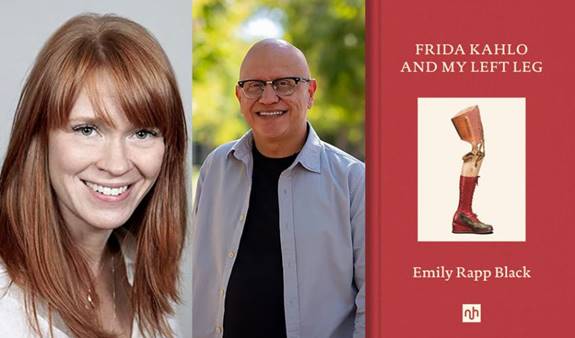 SANTA BARBARA — The Santa Barbara Museum of Art to present “Controlling the Narrative: Both/And Parallel Stories (via Zoom) at 5:30 p.m. Thursday, Oct. 14.
SANTA BARBARA — The Santa Barbara Museum of Art to present “Controlling the Narrative: Both/And Parallel Stories (via Zoom) at 5:30 p.m. Thursday, Oct. 14.
In a conversation and reading, Emily Rapp Black, award-winning author of Poster Child: A Memoir and The Still Point of the Turning World, a New York Times bestseller, explores art and disability in her most recent book Frida Kahlo and My Left Leg. With elegance, tenderness, and zero sentimentality, she deconstructs the mythologies of words like bravery and resilience and recognizes in Kahlo a twin at the art of creating to silence pain. Joining her is colleague Alex Espinoza, Tomás Rivera Endowed Chair of Creative Writing at UC Riverside and author of novels Still Water Saints and The Five Acts of Diego Léon, and the recent nonfiction bookCruising: An Intimate History of a Radical Pastime.
Free SBMA Members/$10 Non-Members
Get tickets at tickets.sbma.net.
More about Emily Rapp Black:
Emily Rapp Black is the author of Poster Child: A Memoir(BloomsburyUSA) and The Still Point of the Turning World(Penguin Press), a New York Times bestseller and an Editor’s Pick. A former Fulbright scholar, she was educated at Harvard University, Trinity College-Dublin, Saint Olaf College, and the University of Texas-Austin, where she was a James A. Michener Fellow. A Guggenheim Fellow, she has received awards and fellowships from the Rona Jaffe Foundation, the Jentel Arts Foundation, the Corporation of Yaddo, the Fine Arts Work Center, Fundacion Valparaiso, and Bucknell University. Her work has appeared in VOGUE, the New York Times, Die Zeit, The Times-London, Lenny Letter, The Sun, TIME, the Boston Globe, the Wall Street Journal, O the Oprah Magazine, the Los Angeles Times and other publications and anthologies. She is currently Associate Professor of Creative Writing at the University of California-Riverside, where she also teaches medical narratives in the School of Medicine. She is a member of the Inequities in Health Care Working Group and an architect of the Medical Narratives minor in the College of Humanities and Social Sciences. She was recently named the nonfiction editor of The Los Angeles Review of Books. Her book that explores art and disability through the life of Frida Kahlo is forthcoming from Nottinghill Editions/New York Review of Books in 2021.
More about Alex Espinoza:
Alex Espinoza was born in Tijuana, Mexico to parents from the state of Michoacán and raised in suburban Los Angeles. He holds a BA in Creative Writing from the University of California-Riverside and an MFA from UC-Irvine’s Program in Writing. His first novel, Still Water Saints, was published by Random House in 2007 and was named a Barnes and Noble Discover Great New Writers Selection. The book was released simultaneously in Spanish, under the title Los santos de Agua Mansa, California, translated by Lilliana Valenzuela. His second novel, The Five Acts of Diego León, was also published by Random House in March 2013. His fiction has appeared in several anthologies and journals, including Inlandia: A Literary Journey Through California’s Inland Empire, The Southern California Review, Flaunt, and the Virginia Quarterly Review. His essays have been published at Salon.com, in the New York Times Magazine, in The Other Latin@: Writing Against a Singular Identity, in The Los Angeles Review of Books, Los Angeles Magazine, and as part of the historic Chicano Chapbook Series. His awards include a 2009 Margaret Bridgeman Fellowship in Fiction to the Bread Loaf Writers’ Conference, a 2014 Fellowship in Prose from the National Endowment for the Arts, a 2014 American Book Award from the Before Columbus Foundation for The Five Acts of Diego León, and a 2019 fellowship to MacDowell. His newest book,Cruising: An Intimate History of a Radical Pastime, was published by The Unnamed Press in June, 2019. Alex is also deeply involved with the Puente Project, a program designed to help first-generation community college students make a successful transition to a university.
